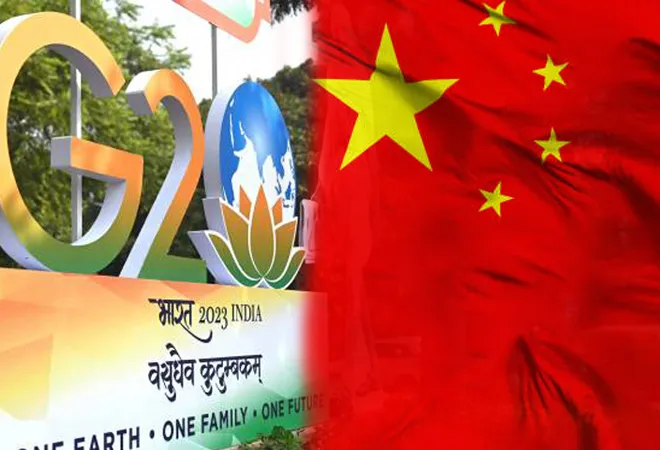
India’s G20 presidency and SCO presidency has been creating quite a buzz within the Chinese strategic circles. What remains to be seen is which country, India or China, can better leverage the occasion to its advantage and gain an upper hand in the increasingly complicated bilateral equations.
On one hand, there are hopes that China can and should seize the opportunity to pressurise India to soften its stance towards China. Chinese scholarly community argue that since India is going to host a series of international events this year where China’s participation is critical, India has little option but to mend ties with China, play down the border dispute, at least in the short term, so as to hold a successful G20 summit and SCO summit.
“India is giving much importance to its hosting the G20 summit next year. Under such circumstances, the Modi government hopes to get China's support, and hopes to let Chinese leaders go to India to participate in the G20 summit. This is why PM Modi took the initiative to shake hands with President Xi at the G20 Bali summit just past,”
noted Liu Zongyi, Secretary General, Center for China and South Asia Studies, Shanghai Institutes for International Studies.
The Modi government hopes to get China's support, and hopes to let Chinese leaders go to India to participate in the G20 summit.
Afterall, the Chinese side notes, neither the G20 summit nor the SCO summit can be successfully held without China's active participation. This is because if China chooses to not
participate, many issues will be left unaddressed, and India's important neighbours might also choose to not attend these summits in China’s absence. This, they argued, will surely put India’s international reputation and influence at stake.
On the other hand, there are rising concerns amongst Chinese strategists that India might also seek to use the G20 platform as a political tool to maximise its self-interest. Referring to India holding some of the events of the G20 summit in Kashmir and the Ladakh region, or India recently hosting the Voice of Global South summit, involving more than 120 nations from the Global South, Chinese observers accuse India of political manipulations, playing tricks or plotting against China.
Of late a new concern seemed to have further gripped the Chinese strategic community that India might take home field advantage to “attack” China on a series of sensitive issues, particularly the China-India border dispute at the upcoming G20 Foreign MinistersMmeeting that is to be held in New Delhi in early March, 2023.
Taking cues from various Indian media outlets, Chinese analysts are of the opinion that the Modi government might be seeking to leverage the G20 summit to intensify and internationalise the China-India border row. It is noted with concern that at the sideline of the main summit meeting, India is planning to hold bilateral meetings with the key western nations such as the US, Britain, France, Germany, and Japan, to discuss the China-India border row, provide them with documented evidence of China violating existing agreements at the LAC, and thereby, win political and military support on the issue.
Chinese analysts are of the opinion that the Modi government might be seeking to leverage the G20 summit to intensify and internationalise the China-India border row.
In the Chinese assessment, this is a significant shift in India’s China policy under PM Modi. As a part of this strategic shift in its foreign policy, India has intensified its game and is attempting to use international power to checkmate China at the LAC. As a part of the ongoing trend, first, it conducted a joint military exercise with the US in an area close to the LAC. Next, it held the first ever joint fighter jet exercise with Japan, revealing the secrets of PLA’s Sukhoi series of fighters to Japan, which are often used by China during air confrontation activities in the East China Sea.
Thus, questions are being raised within the Chinese strategic community that while assuming the rotating presidency of the G20, when India publicly called for international cooperation to deal with global issues, did it mean only the conflict between Russia and Ukraine or was it aiming to also elevate and internationalise the China-India border dispute to the level of “global issue”? Will India be able to garner adequate support from other countries on this issue? Won’t the US and other Western powers who have successfully intervened in the Taiwan issue, tempted to interfere in the China-India border row as well, so as to put pressure on China from two directions. What should be China’s countermeasures in that case, will China back down in the face of international pressure?
Chinese observers are of the opinion that Chinese Foreign Minister Qin Gang should go prepared for a explosive foreign ministers meeting, where he might need to publicly confront Minister Jaishankar and a group of foreign ministers from Western countries, likely to support India’s position in the border row. It is further advocated that the minister should warn India that any attempt to “unilaterally internationalise the China-India border issue will lead to the regional security situation taking a turn for the worse, with the Sino-Indian border conflict becoming another crisis similar to the Russia-Ukraine war.
Meanwhile, others are advocating that China must make India pay for its increasingly hardened stance vis-à-vis China by upping the game at the LAC. The pretext for China once again showing its muscles at the LAC could be anything, like “
sobering down an arrogant India jubilant over its population as well as economic growth rate surpassing that of China’s”, or “
responding to Indian provocation of carrying out high-level military exercises in the sensitive Sino-Indian border area, particularly in the Chinese territory of South Tibet (Arunachal Pradesh)”, but the objective is to let India know that China has many means to implement countermeasures, and that the initiative is still in China's hands.
Chinese observers are of the opinion that Chinese Foreign Minister Qin Gang should go prepared for a explosive foreign ministers meeting, where he might need to publicly confront Minister Jaishankar and a group of foreign ministers from Western countries, likely to support India’s position in the border row.
The
military strategies in this regardare worth noting, for instance, working out a “multiple hot-spot strategy” at the LAC. Under this strategy, the Chinese side maps out multiple targets at the LAC that they can simultaneously attack, preferably in a “2+1” format, i.e., two points with10 kilometres, plus another point that is hundreds of kilometres away from the first two points, and develop capabilities for operating these multiple targets at the same time.
Secondly, adopting the “horn tactic” in constructing border fortification projects in sensitive areas at the LAC, where bunkers 2-3 sites are simultaneously built within one facility, forming a horn-like structure, so that if one site gets attacked, the other sites can send troops to outflank, intercept, or raid the opponent.
Thirdly, following a two-pronged strategy at the LAC. This include improving the level of staff and equipment modernisation, strengthening the use of unmanned aerial vehicles or drones, establishing and making good use of an integrated air-space surveillance system, thereby maintaining and improving logistics supply advantage over India. On the other hand, adopting “traditional tactics in modern warfare” that is utilising natural features such as mountains, rivers, lakes, ravines, and climate, and attaching great importance to the use, protection, and occupation of favourable terrains along the LAC.
To conclude, one can argue that as India pulls out all the stops to successfully host its first ever G20 summit, it cannot and shouldn’t underestimate the China factor. From borders to the boardrooms, India must prepare well to face the China challenge during its G20 presidency.
The views expressed above belong to the author(s). ORF research and analyses now available on Telegram! Click here to access our curated content — blogs, longforms and interviews.



 India’s G20 presidency and SCO presidency has been creating quite a buzz within the Chinese strategic circles. What remains to be seen is which country, India or China, can better leverage the occasion to its advantage and gain an upper hand in the increasingly complicated bilateral equations.
On one hand, there are hopes that China can and should seize the opportunity to pressurise India to soften its stance towards China. Chinese scholarly community argue that since India is going to host a series of international events this year where China’s participation is critical, India has little option but to mend ties with China, play down the border dispute, at least in the short term, so as to hold a successful G20 summit and SCO summit.
“India is giving much importance to its hosting the G20 summit next year. Under such circumstances, the Modi government hopes to get China's support, and hopes to let Chinese leaders go to India to participate in the G20 summit. This is why PM Modi took the initiative to shake hands with President Xi at the G20 Bali summit just past,”
India’s G20 presidency and SCO presidency has been creating quite a buzz within the Chinese strategic circles. What remains to be seen is which country, India or China, can better leverage the occasion to its advantage and gain an upper hand in the increasingly complicated bilateral equations.
On one hand, there are hopes that China can and should seize the opportunity to pressurise India to soften its stance towards China. Chinese scholarly community argue that since India is going to host a series of international events this year where China’s participation is critical, India has little option but to mend ties with China, play down the border dispute, at least in the short term, so as to hold a successful G20 summit and SCO summit.
“India is giving much importance to its hosting the G20 summit next year. Under such circumstances, the Modi government hopes to get China's support, and hopes to let Chinese leaders go to India to participate in the G20 summit. This is why PM Modi took the initiative to shake hands with President Xi at the G20 Bali summit just past,”  PREV
PREV


